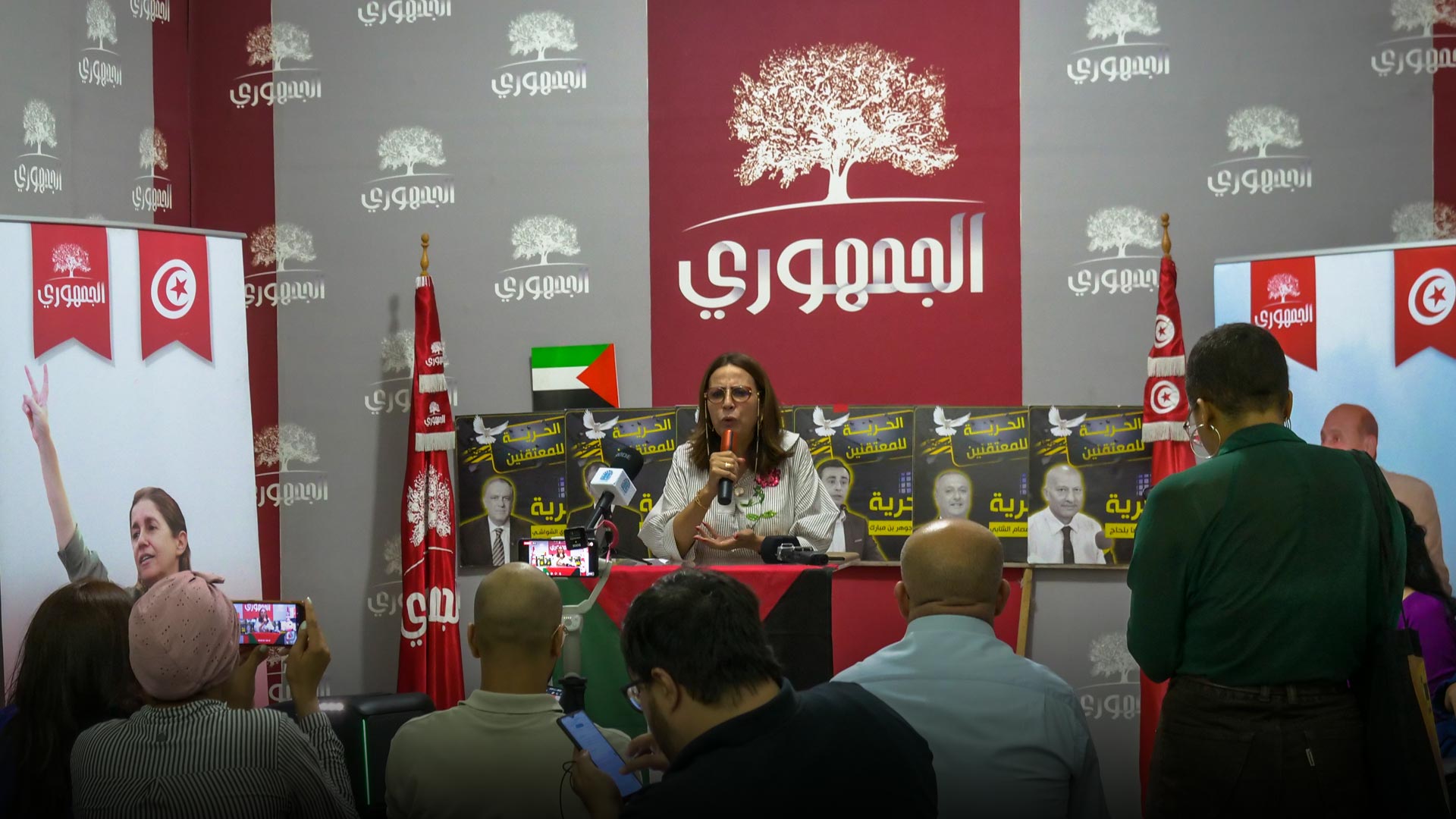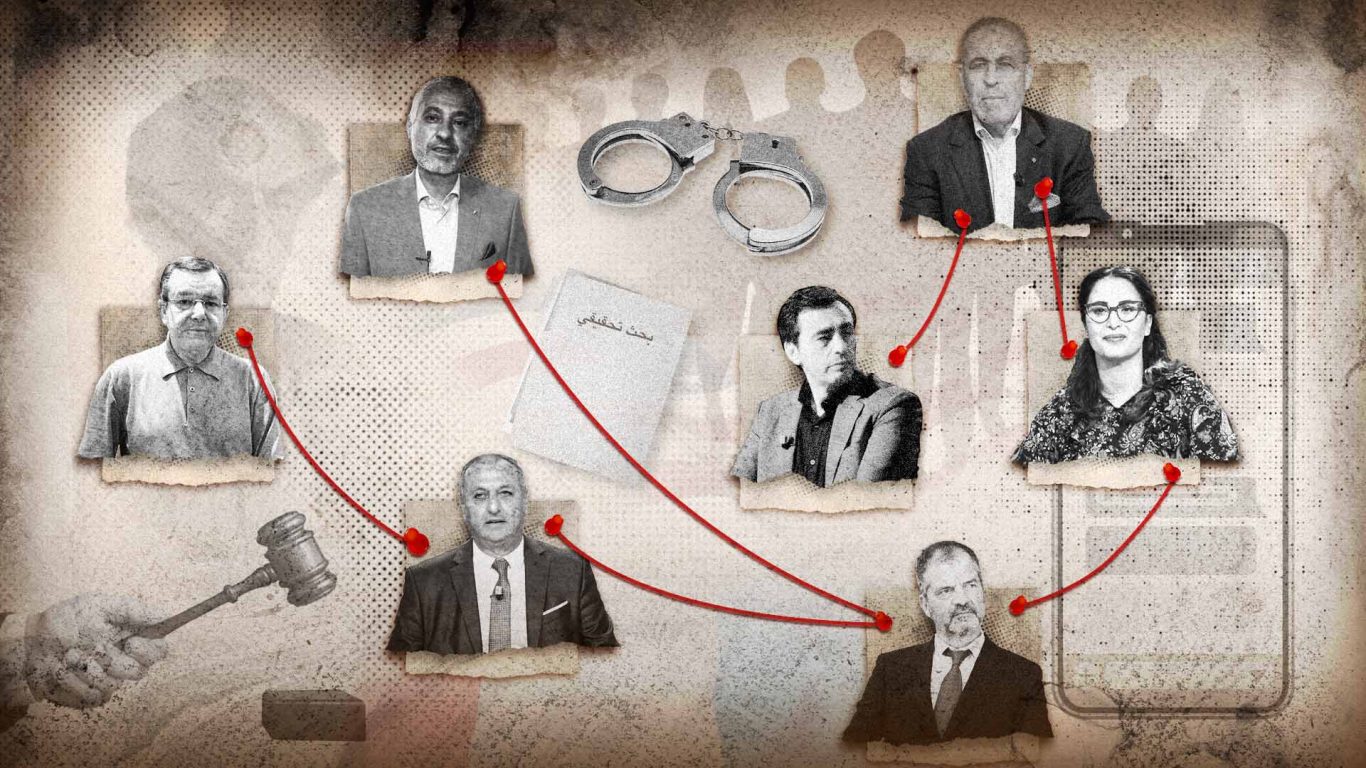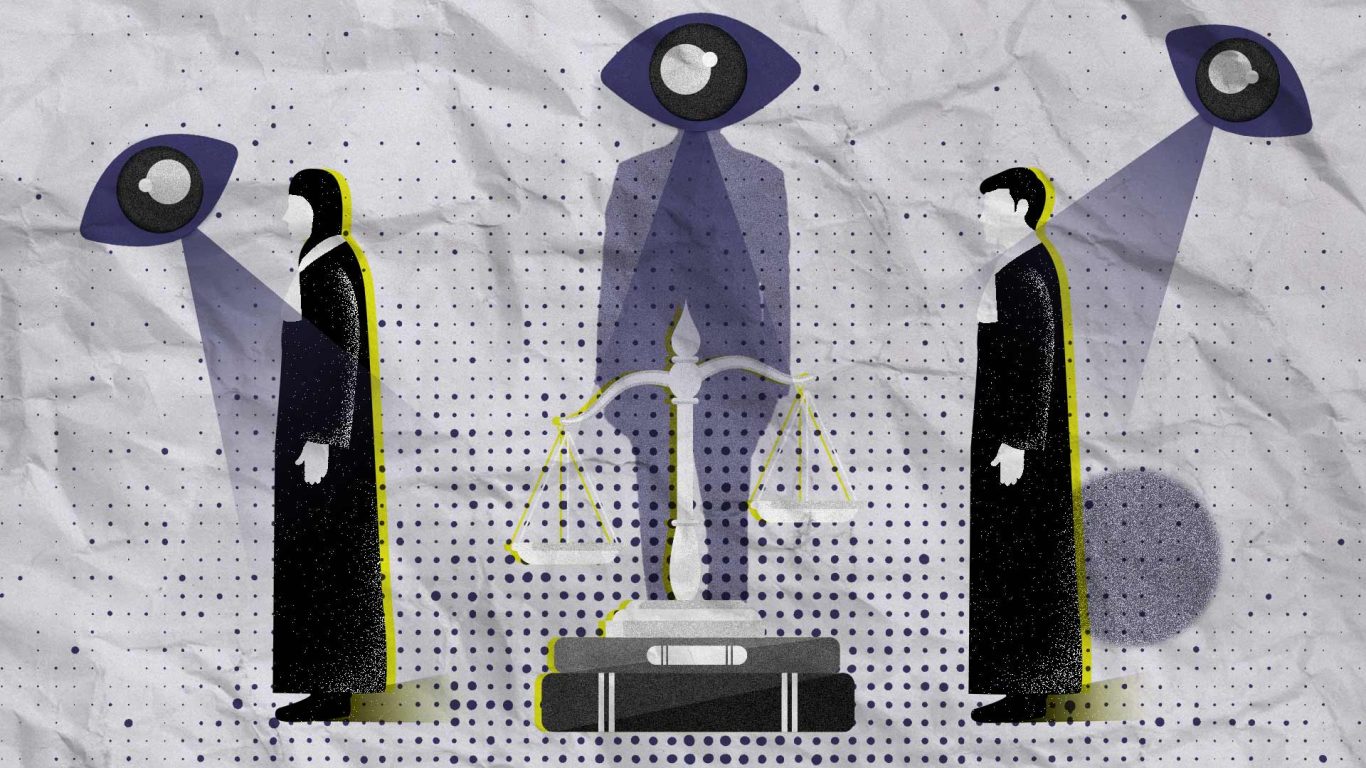"We didn't know where he was, so we went to the Rabta hospital, then Mongi Slim, then Charles Nicolle, before we were told to go to Habib Thameur...". Incarcerated since February 2023, Jawher Ben Mbarek, founder of the "Citizens Against the Coup" collective and member of the National Salvation Front (NSFT*), was taken to hospital on October 9 after feeling unwell.
"It was the third time in three days," said his father Ezzeddine Hazgui, who was also present at the party headquarters that evening. "He fainted right in front of his lawyers". Jawher Ben Mbarek had stopped eating for two weeks, as part of an open hunger strike to protest against his incarceration.
Dalila spoke at the Al Joumhouri headquarters before a crowd of around thirty people, most of whom were also family members of the political prisoners. Some of these detainees have also been on hunger strike for several days, in solidarity with Jawher. The expressions on their faces conveyed a sense of gravity. "A hunger strike is never trivial," remarked a relative of another prisoner.
Following his admission to hospital and the incessant call from his supporters to end the strike, Jawher Ben Mbarek and his fellow prisoners resumed eating a few days later, on October 12. By ending their strike, the detainees have undoubtedly marked the beginning of a new chapter for Tunisia's opposition forces, most of whom have shown unprecedented solidarity during these times.
A hunger strike from within the cells
Jawher Ben Mbarek started his hunger strike on September 26, 2023 in protest against his imprisonment. The activist is currently being held in connection with the so-called conspiracy against State security case, along with several other opposition political figures.
On the same subject
In a statement announcing the beginning of the strike, the Al Joumhouri party, one of the main mouthpieces of political prisoners, whose leader Issam Chebbi is also in detention, warned that the strike could present "a danger to his health". This did not deter Jawher Ben Mbarek from carrying on with the strike, and having others follow his lead.
In fact, several other political figures charged in the conspiracy against State security case went on hunger strike on October 2, namely Noureddine Bhiri (Ennahdha executive), Ghazi Chaouachi (former Secretary General of Ettayar), Ridha Belhaj (lawyer and founding member of Nidaa Tounes), Khayam Turki (former Ettakatol executive) and Issam Chebbi.
Other political prisoners detained in connection with other cases have also joined the strikers. Ennahdha leader Rached Ghannouchi, arrested in April, was one of the first to follow in Jawher's footsteps. His party issued a press release announcing a three-day strike "in solidarity with Jawher Ben Mbarek and the other political detainees''.
An opposition movement of political figures and civil society
Between September 26 and October 5, leaders from several opposition parties went on hunger strikes. In addition to Al Joumhouri and Ettayar, several political actors from the NSFT bloc joined the movement, even though some of them were still free at the time, such as Rafik Abdessalem (Ennahdha) and Oussama Khlifi (Qalb Tounes).
Over 80 personalities are reported to have taken part in spontaneous hunger strikes. Many of them do not belong to the political sphere, such as journalists like Zied El Heni, feminist activists like Yosra Frawes, or lawyers like Abderrazak Kilani.
For the most part, these strikers went on 72-hour strikes. "The idea was to shift the focus back to the issue of political prisoners, and to remind people of how their rights have been violated," said Hatem Nafti, essayist and member of the French-based Tunisian Observatory of Populism.
Hatem Nafti also deliberately abstained from food for three days starting October 1. "I lost 5.5 kg after three days of fasting, which is not without implications," he explained.
"I don't want to say it's a desperate move, but there's a sense of helplessness... We're up against a game that is totally rigged," he said.
The author believes that, beyond expressing solidarity with political prisoners, the ultimate objective was to "remind people that the judiciary is not an independent body and that it takes its orders from the regime". He then made an explicit reference to the dissolution of the Supreme Judicial Council (CSM) and the case of the dismissed judges, which seem to have confirmed the "subjugation of the judiciary to the ruling power ".
On the same subject
"Ben Ali and Bourguiba used to sugarcoat everything," added Hatem Nafti. "Now it's 'I decide and that's how it is', while at the same time claiming that the judiciary is independent... it's Kafkaesque."
Mobilizing public opinion, an uphill battle
The willingness to support political prisoners combined with a sense of injustice have undeniably served as a unifying force, bringing most political opposition groups together until the end of the hunger strike. However, this was not enough to extend the movement to the streets.
The Free Destourian Party (PDL), which was largely absent from the mobilization, made no statements to support the movement, despite the fact that several strikers condemned the arrest of its leader, Abir Moussi, on October 3. "I totally disagree with her on certain issues, but she's facing the death penalty, which is outrageous", said Hatem Nafti.
At the same time, it has been difficult for the strikers to mobilize people beyond opposition figures. A call for a hunger strike directed at " all citizens with a free conscience" was issued by the Al-Joumhouri party on October 4. The following day, the families of political prisoners held an open sit-in at the party's headquarters, and went on a 24-hour hunger strike.
"It was the least we could do," says one sit-in participant, also a family member of one of the detainees. "24 hours is nothing compared to what the prisoners are doing."
"We wanted to put more pressure on the ruling power," said Houda Mansouri, one of the leaders of the Al-Joumhouri party. "We had to publicly embarrass the regime to ensure that the prisoners' cause wouldn't be forgotten".
The detainees' supporters also organized a " day of anger" at the Al-Joumhouri headquarters on October 5. However, photos of the rally have made it clear that the movement had failed to mobilize more than just the prisoners' families.
The response was also mixed abroad, as the movement sought to mobilize the Tunisian diaspora as well. In France, the Committee for the Respect of Freedom and Human Rights in Tunisia (CRLDHT) responded to the call to organize a "day of anger", with a rally at the association's premises in Paris. The movement proved relatively limited, based on the images posted on social networks
According to CRLDHT President Mohieddine Cherbib, "There were not only Tunisian human rights activists, but also Moroccans and Algerians."
After the strikes comes a "lengthy battle"
It is now obvious that the strikes didn't have any immediate impact on the fate of the prisoners. "We've just completed a series of actions, so we need to give it time to take effect", declared Dalila Ben Mbarek Msaddek. She added that "the wave of support has been a tremendous source of strength and courage" for her brother.
Beyond the moral support or the light shed on their struggle, the strikers are also setting their action in the long term. "There's also a moral battle," affirmed Hatem Nafti. "It's a lengthy battle, and it's not my hunger strike that's going to change everything," he added.
"Our aim was to cast doubt on the morality of the regime. That's the longer-term objective, and it will happen eventually: the moral erosion of regimes", says Hatem Nafti.
"Being reminded that these are unjust regimes ultimately seeps into society (...). We've seen it happen with Ben Ali". As a matter of fact, hunger strikes have played a key role in the history of social mobilization in Tunisia.
Similar movements had taken place in the mid-2000s, notably the October 2005 hunger strike. Having received international media coverage, its organizers described it as "a key milestone", as it successfully managed "to bring together different political parties and backgrounds".
"Hunger strikes are a peaceful means of resistance, like distributing a leaflet or occupying a public square," explained Mohieddine Cherbib, who is also a veteran of hunger strikes through his involvement with the CRLDHT.
"We've already done it during the Gafsa mining basin movement in 2008*". A series of hunger strikes was launched by local activists, notably unemployed graduates. Mohieddine Cherbib himself was sentenced at the time for supporting the social mobilization. Other individuals were arrested, and they too went on hunger strikes to protest against their detention, including journalist Fahem Boukaddous.
Despite the repression, many observers consider the Gafsa strikes to be one of the major turning points in the gradual destabilization of the Ben Ali regime*.
Although the 2023 strikes have taken place against a decidedly different backdrop, some activists are determined to continue the mobilization over the long term. "We want to keep the 'atomic weapon' aspect," explained Hatem Nafti, "but if I feel that the conditions are once again right to create an electroshock, I will not hesitate to do it again”.






